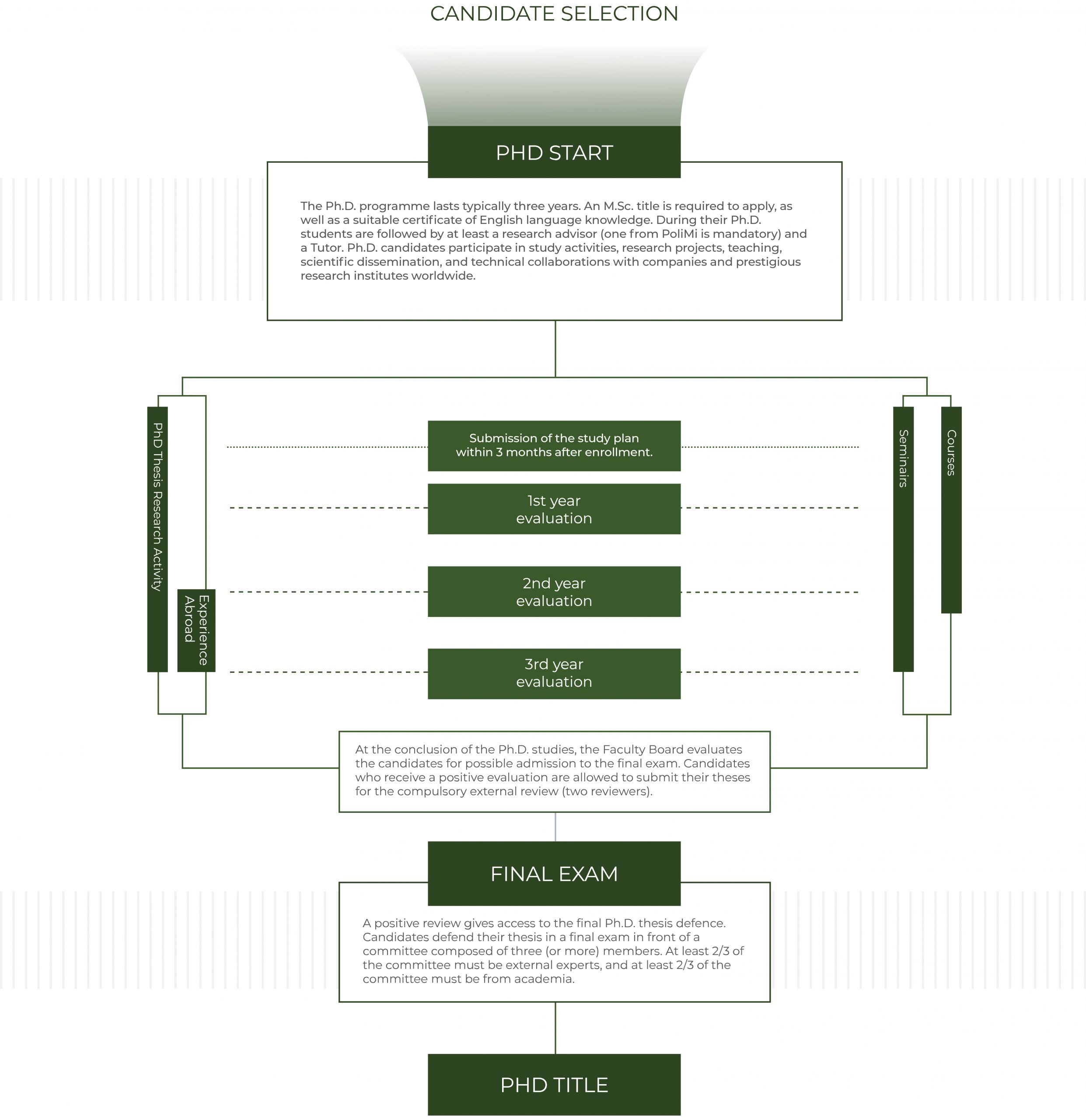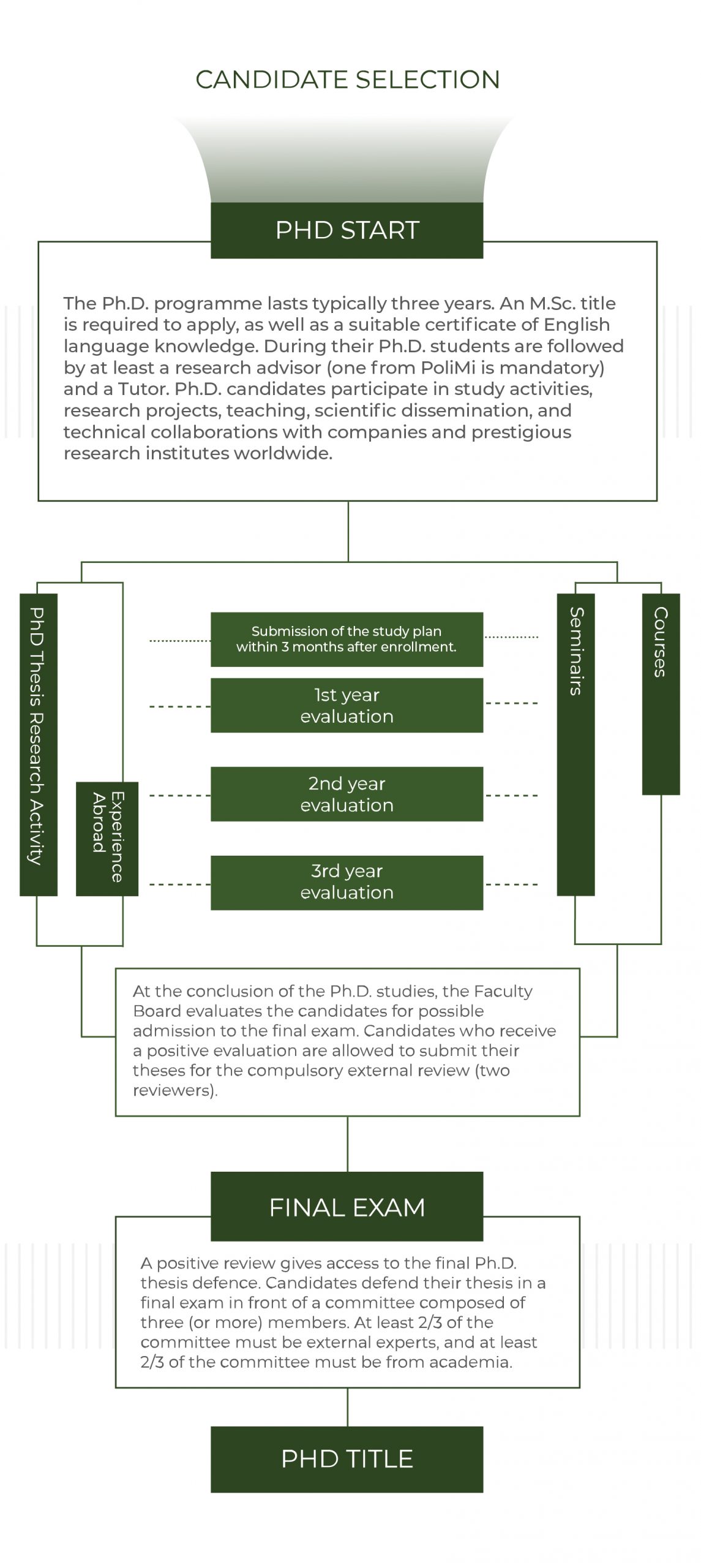Ph.D. in DADS
The Ph.D. program in Data Analytics and Decision Sciences (DADS) aims at training highly qualified senior data analysts and data managers capable of carrying out research at universities, international institutions, tech and financial companies, regulatory authorities, and other public bodies.
The program stems from the cooperation between three departments: Dipartimento di Elettronica, Informazione e Bioingegneria (DEIB), Dipartimento di Ingegneria Gestionale (DIG), Dipartimento di Matematica (DMAT), and the Health Data Science Center (HDS) at Human Technopole. It allows the enrolled students to work in a highly interdisciplinary environment with strong connections to international research centers and private companies. The program provides successful candidates with the opportunity to acquire a high degree of professional expertise in specific scientific and technological fields.
The programme spans three years. Upon successful completion and final examination, candidates are awarded a Ph.D. in Data Analytics and Decision Sciences. The first year is dedicated to two key objectives: completing courses that build a strong interdisciplinary skill set and comprehensive competences essential for data analytics, and formulating the research plan. The subsequent two years focus primarily on developing the doctoral thesis. Students are strongly encouraged to spend a semester abroad (ranging from a minimum of three months to a maximum of 18 months) at a research institution, benefiting from the extensive network of international collaborations established by the three departments involved in the programme. During this period, they may receive a 50% increase in their Ph.D. fellowship for up to six months.
3 years
Milano Leonardo and Bovisa
3
5 – 10
Start here
The Ph.D. programme
The DADS Doctoral Programme is a multi-departmental endeavour based at the Dipartimento di Elettronica, Informazione e Bioingegneria and involving two other departments of Politecnico di Milano and the Health Data Science Center of Human Technopole.
The primary focus of the PhD program in Data Analytics and Decision Science lies in data science. This entails the capacity to analyze massive datasets of high quality derived from diverse and varied sources of data, and to employ the most appropriate methodologies to extract valuable insights and address practical challenges across various application domains. For this purpose, methods and approaches for data retrieval, fusion, and integration are explored in depth, along with analysis strategies tailored to address both well-defined and complex problems.
At a broader level, a key skill developed during the Ph.D. programme is the ability to effectively transfer the knowledge generated, adapting it to the specific context, audience, and communication setting. This ability enables Ph.D. graduates to work efficiently in teams and to disseminate their research findings both within their field of expertise and to wider, more diverse audiences.
Throughout the Ph.D. journey, the programme aims to equip all candidates with technical communication skills, both oral and written, that can be adjusted depending on the intended audience, whether academic or non-academic. This objective is pursued through the training offered by the PhD School, which includes courses in Technical Communication. The Ph.D. thesis should contribute to the advancement of knowledge in the candidate’s research field. The original research results are compiled in the Ph.D. thesis, where the candidate’s contribution is placed in relation to the current state of the art in the specific research field. The research results are validated through the scientific dissemination process, with peer-reviewed publications in international conferences and journals. Moreover, the extensive network of international collaborations with universities and research institutions of DADS faculties will provide unique opportunities for Ph.D. candidates to be exposed to the most advanced research in AI for Healthcare and Precision Medicine, Technology for Industry, Sustainable Mobility, Analytics for Equality and Society, as well as to visiting periods of at least six months abroad.
DADS graduates are equipped with distinctive skills and advanced trans-disciplinary knowledge that open up career opportunities as analysts or researchers at universities, international research centres, public and private institutions, R&D departments, regulatory authorities, companies, policy institutions, and others.
Research Lines & Educational Activities
The primary goal of all Politecnico di Milano’s Ph.D. programmes is to cultivate a research-oriented attitude in the candidates, as well as advanced knowledge and proficiency in a particular research area. To achieve this, candidates must be able to identify and solve complex problems, perform in-depth problem analysis, come up with original solutions, and assess their applicability in practical contexts. These abilities give Ph.D. candidates great potential for growth in their research, both in the academic world and in public and private organisations. Ph.D. candidates must create an original research contribution that is in line with the DADS scope.
The DADS PhD programme aims at breeding the next generation of data scientists who will tackle the challenges and the opportunities created by the increasing availability of massive amount of data in different fields of application, from health to mobility, from automation to environmental protection, from the design and operation of infrastructures to strategic investments, still attentioning equality and sustainability.
These data scientists will be able to capture the relevant aspects of phenomena at play in the specific domain knowledge under study, to develop adequate models, to supervise the development of analytic pipelines, to critically analyze the results, and to support the technological transfer.
During the first two years of their Ph.D., students must complete a minimum of 20 credits by taking at least four doctoral courses. These courses provide advanced knowledge and training to help students address research issues.
The DADS programme offers 3 thematic doctoral courses each year, taught by DADS faculty or invited professors from international institutions. These courses are open to all enrolled students as well as external attendees, and are aimed to provide a common baseline background to students.
The Politecnico di Milano’s Ph.D. School also offers transversal skills courses to develop skills that are not related to the specific curriculum, such as oral and written presentation, research management, ethics of research, public speaking, and many others.
Doctoral courses taken from other universities or Ph.D. schools, as well as summer/winter schools, offer additional training opportunities.
Ph.D. students can be involved in teaching activities as teaching assistants at the Bachelor or Master levels, and can take part in tutoring activities for the orientation of new candidates or activities of the DADS programme. Participation in teaching and student tutoring activities is encouraged to develop communication and team leading skills.
Throughout the three-year Ph.D. program, students will be expected to present their research accomplishments in a variety of settings, including public seminars at Politecnico di Milano or other institutions, project meetings, workshops, and international scientific conferences. This will give Ph.D. students the opportunity to hone their public speaking skills and enhance their communication abilities in both written and verbal forms.
Additionally, Ph.D. students may attend schools and visit other research centers and facilities both in Italy and abroad, for a recommended period of 6 months, to conduct their research.
Ph.D. students are provided with the resources and facilities they need to conduct their work and access scientific papers and technical documentation from both local and international databases. Additionally, they can benefit from services such as subscriptions to scientific associations and language courses. Furthermore, they are allocated a personal budget to cover research-related and travel expenses.
Our University
Politecnico di Milano is a public scientific-technological university founded in 1863, which trains engineers, architects and industrial designers. The Politecnico has always focused on the quality and innovation of its teaching and research, developing a fruitful relationship with the industrial and productive world by means of experimental research and technological transfer. Research has always been linked to teaching and it is a priority commitment which has allowed the Politecnico to achieve high-quality results at an international level. The Politecnico takes part in several cooperation agreements and strategic alliances with other universities and scientific institutions, as well as industrial companies.

People & Contacts
The Ph.D. course is managed by a Coordinator and a Faculty Board. The Coordinator chairs the Faculty Board, coordinates the preparation of the annual Educational Programme and organises the general educational activities of the Ph.D.

